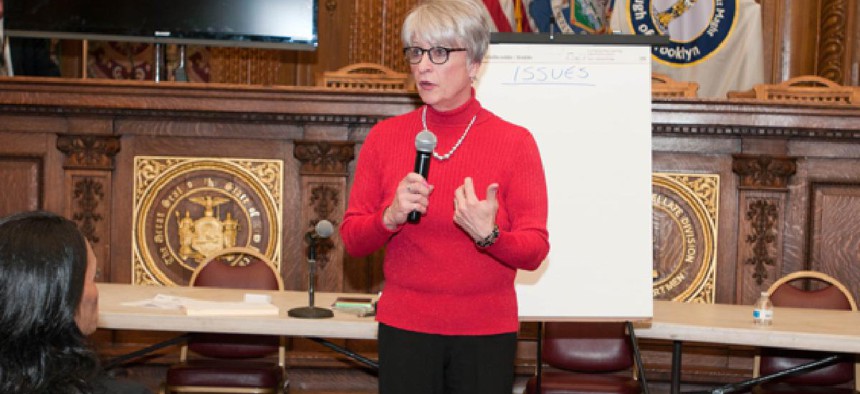Transgender advocates across the state assess needs, strategize

Because there is no federal law prohibiting discrimination against the transgender community, every state can be considered a battleground in the fight for transgender civil rights. Currently 18 states and the District of Columbia have laws that clearly prohibit discrimination against transgender people. Unfortunately, New York is not one of the progressive few.
In 2002, the Sexual Orientation Non-Discrimination Act (SONDA) was created to protect gays and lesbians from discrimination in housing, employment and public accommodations. Empire State Pride Agenda, a statewide advocacy organization, along with other advocacy groups, decided that the bill should not include transgender language, since this would hamper its passage. SONDA was passed by the Legislature in December of 2002 and signed into law by Gov. George Pataki.
At that time, the transgender community was basically told, “Don’t worry, we’ll get you next year.” However, as of the end of the 2016 Legislative session, “next year” still has not come. The state Assembly has passed the Gender Expression Non-Discrimination Act (GENDA) nine years in a row and Gov. Andrew Cuomo has promised his approval, but the bill has never made it to the floor of the Republican-led state Senate for a vote.
Late last year through an executive action Cuomo directed the State Division of Human Rights to issue regulations that extend protections in the New York State Human Rights Law to protect transgender people from discrimination in housing, employment and public accommodations. Since this action does not require a bill to pass the divided Legislature, the regulations serve as a “half step” toward transgender equality. In order to have complete equality there must be an explicit law. Thus GENDA must be passed sometime in the future.
Following the news of the Cuomo regulations, the Empire State Pride Agenda announced that it was disbanding, suggesting that their work was done. These two events left the New York State Transgender Community in a quagmire: We still did not have an explicit civil rights law to protect us, and we no longer had a statewide advocacy group to speak for us. Little or no organizing or training had been done in our community, and no transgender-focused legislative agenda had been created to deal with important issues affecting our community beyond the stalled GENDA legislation.
My organization, the Long Island Transgender Advocacy Coalition (LITAC), was founded in 2005 to engage in education, advocacy and outreach in order to achieve public understanding and support for the transgender community. LITAC is in the initial stages of becoming a nonprofit, and our nearly 200 members help create social change by actively participating in demonstrations, rallies and marches. Last year LITAC received a grant from the Long Island Community Foundation, through the Unitarian Universalist Fund that provided the capital and momentum needed to connect with other activists around the state and begin discussions of our next steps. In February, we began using conference calls to create what we call the New York State Transgender and Gender Nonconforming Town Hall Project.
Our plan was simple: bring together transgender and gender non-conforming (GNC) people, their families, friends and allies to create connections within the various communities around the state. We believed these town hall meetings would be a springboard to create a movement for social, economic and racial justice for all transgender and gender variant people in New York.
These regularly-scheduled statewide meetings would help us find out firsthand what the needs of our communities are, allowing advocates to create a comprehensive legislative agenda. Further, they provide training to community members interested in advocacy work and prepare them to engage in education and outreach.
In the first half of 2016 we held eight Community Town Halls in seven locations across the state, from Buffalo and Rochester to Long Island. We have included urban communities like Brooklyn and Albany, as well as smaller and more rural communities like Oneonta and Plattsburgh. Community members spoke openly about their needs and the issues that restrict their safety, equality and ability to succeed. Their responses are the beginning of the legislative agenda our community sorely needs.
As you would expect, major topics include discrimination, legal issues, health care, housing, education and employment opportunities. Much time was spent on issues that deal directly with our community’s fragile condition, like substance abuse, the lack of services for our homeless youth, food insecurity and the serious effects of the rampant HIV and Hepatitis C epidemics. There are concerns for the prison population, the disabled and the aging trans communities. The need for training in government agencies, colleges, and medical services was cited.
Perhaps the most poignant moment came after a less-than-effective Town Hall in Oneonta. During the event, every suggestion or new idea was countered with a negative “We tried that already” or “It will never work.” After three hours of unmotivated feedback, we left feeling quite down. A little over a month later we called the Unitarian Church to set an autumn date for the next event and were told that after our meeting, the group began to get organized and decided that they would work together to create an LGBT center in Oneonta!
Finally, community members were very honest about the need for self-actualization and coalition building. We began a to-do list which hopefully will become the action list for work around the state. We are not starry-eyed, but we realize that only through organized commitment, active participation and a strong, unified community voice will we change the serious issues we face.
Juli Grey-Owens is the executive director of LITAC, the Long Island Transgender Advocacy Coalition, and regularly speaks at public forums about the need for statewide transgender civil rights. Grey-Owens is also the founder and owner of Transgender Management Consulting, an organization which works to help organizations become transgender inclusive.
